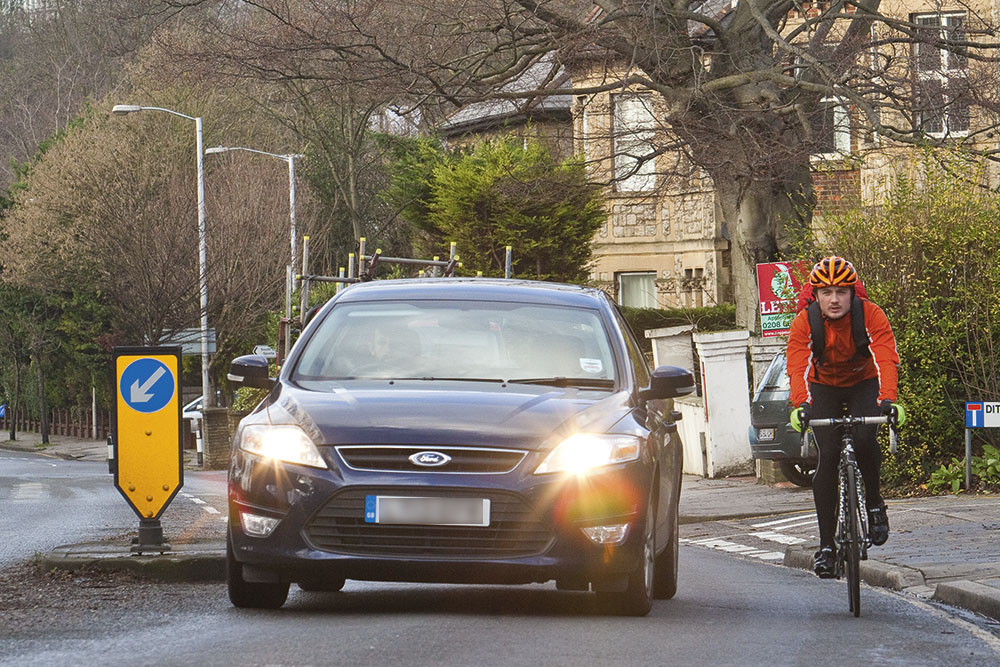'Close pass' scheme rejected by police as drivers would have to move into opposite lane to overtake cyclists
Cambridgeshire Police also reject scheme as it could mean motorists have to slow down behind cyclists

Cambridgeshire Police have rejected a scheme designed to protect cyclists from close passes from vehicles as it could force motorists to move into the opposite lane to overtake and mean they needed to slow down when unable to overtake.
Operation Close Pass, which has seen a reduction of 20 per cent in the number of cyclists killed or seriously injured in the West Midlands where it was first rolled out, has been deemed not "practical" due to the "lack of road space" in Cambridge.
>>> Passing judgement: How 'Operation Close Pass' is bringing bad drivers to book
The scheme uses plain clothes officers on bikes equipped with video cameras to target offending drivers. When a vehicle passes too close another officer stops it and the driver given an education input pointing out the error of their ways. Only the most serious offenders are prosecuted.
22 police forces across the UK are currently carrying out the scheme, but Cambridgeshire Police will not be joining because it could force motorists to move into the opposite lane when overtaking, or to slow down when unable to overtake.
Watch: Five tips for safer commuting
"The average road [in Cambridge] is approximately 3.5 metres from the kerb to the white lines," Cambridgeshire Police casualty reduction officer Jon Morris told Cambridge News.
Get The Leadout Newsletter
The latest race content, interviews, features, reviews and expert buying guides, direct to your inbox!
"Cyclists are advised to cycle 0.75 metres away from the kerb to avoid drain covers and an average car is about two metres wide. Operation Close Pass recommends drivers leave about 1.5 metres when passing a cyclist.
"If we add all those figures together it would mean drivers are moving into the opposite lane to overtake.
"For Cambridge city where roads are narrower and often very congested we would be potentially forcing motorists to drive at the speed of cyclists when there isn’t the recommended space to overtake."
Local cycling campaign group Camcycle expressed its dismay at the police's decision, pointing out that the city's narrow streets made the need to crack down on close passes even more important.
"Camcycle is beyond disappointed in Cambridgeshire Police," a statement read. "We are angry that they are apparently advising drivers that it is OK to pass closely because maintaining the speed and flow of motor traffic is more important than the safety of vulnerable road users.
"The fact that Cambridge's roads are narrow is precisely the reason why close-passes are a problem here and action should be taken against them. Cambs police contradict Highway Code rule 163 'Give vulnerable road users at least as much space as you would a car'. The accompanying image is clear: you should wait until the opposite carriageway is clear to overtake if there isn't space."
With the police unwilling to take action, the group advises cyclists follow Bikeability guidelines and ride in the middle of the lane on roads which are too narrow for motorists to safely overtake, removing any possibility for drivers to attempt to dangerously squeeze past.

Thank you for reading 20 articles this month* Join now for unlimited access
Enjoy your first month for just £1 / $1 / €1
*Read 5 free articles per month without a subscription

Join now for unlimited access
Try first month for just £1 / $1 / €1
Henry Robertshaw began his time at Cycling Weekly working with the tech team, writing reviews, buying guides and appearing in videos advising on how to dress for the seasons. He later moved over to the news team, where his work focused on the professional peloton as well as legislation and provision for cycling. He's since moved his career in a new direction, with a role at the Department for Environment, Food and Rural Affairs.
-
 Gear up for your best summer of riding – Balfe's Bikes has up to 54% off Bontrager shoes, helmets, lights and much more
Gear up for your best summer of riding – Balfe's Bikes has up to 54% off Bontrager shoes, helmets, lights and much moreSupported It's not just Bontrager, Balfe's has a huge selection of discounted kit from the best cycling brands including Trek, Specialized, Giant and Castelli all with big reductions
By Paul Brett
-
 7-Eleven returns to the peloton for one day only at Liège-Bastogne-Liège
7-Eleven returns to the peloton for one day only at Liège-Bastogne-LiègeUno-X Mobility to rebrand as 7-Eleven for Sunday's Monument to pay tribute to iconic American team from the 1980s
By Tom Thewlis